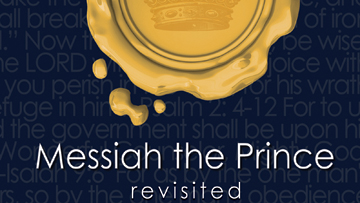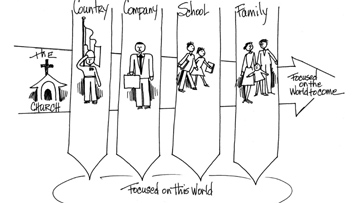You have free articles remaining this month.
Subscribe to the RP Witness for full access to new articles and the complete archives.
Author’s introduction: This book is about Jesus’ dominion, which extends far beyond the church to encompass all people, all governments, all businesses, all families, all things, all thoughts, all ages.
This book is about how Jesus is using that unlimited dominion, right now, to build His church and to save the souls of all His people.
This book is about Jesus’ long-range plan to give a new purpose to all parts of life: to spread righteousness and peace across the globe, across the street and deep in our hearts. It is about His call for us to join Him, as loyal subjects in His kingdom, to take part in His great work of worldwide redemption.
Chapter 1: Why We Need Christ’s Mediatorial Dominion
To save us from our sins, our Savior Jesus Christ has three jobs. He is a prophet, a priest, and a king. As a prophet, Christ proclaims the truth and purposes of God. As a priest, he made a sacrifice to take away our sins. As a king, he rules and reigns over all people.
This book focuses on Jesus Christ’s job as a king, which we all must understand in order to also understand the Christian faith.
The importance of Christ’s kingship is clear from the number of times the Bible talks about Christ as a king. Here are a few examples:
Telling about the coming of Jesus, the prophet Zechariah wrote, “Rejoice greatly, O daughter of Zion! Shout, O daughter of Jerusalem! Behold, your King is coming to you; He is just and having salvation, lowly and riding on a donkey” (Zech. 9:9).
When Jesus Christ finally did arrive in the city of Jerusalem, he rode on a donkey. The angel Gabriel told Mary that Jesus “will be great, and will be called the Son of the Highest; and the Lord God will give Him the throne of His father David. And He will reign over the house of Jacob forever, and of His kingdom there will be no end” (Luke 1:32–33).
Of course, Jesus himself acknowledged that he is a king. When Pontius Pilate inquired, Jesus responded, “You say rightly that I am a king.” (John 18:37)
So what kind of king is Jesus Christ? He is our mediator, which means he is the bridge between God and mankind. All men and women are separated from God by sin. But Christ bridges that giant gap between a holy God and a sinful people. Jesus Christ the Mediator saves us from the land of sin and brings us across the bridge to live with God. So we can call Jesus our savior or our mediator. They mean essentially the same thing.
Like every king, Jesus the Mediator rules over a people and a place. We call the people and the place over which he rules his dominion. Jesus rules over the entire universe and over all people. His dominion is unlimited.
Even though Jesus rules over all things because he is the Son of God, this book is about a different kind of dominion that Jesus has because he is our mediator. God the Father gave Jesus dominion over all things so Jesus could do his job as our mediator and savior. This dominion that Jesus received from God is called his mediatorial dominion.
The rest of this book is about the mediatorial dominion that Jesus Christ the King has over all things, and which he uses to save us from our sins. It is this mediatorial dominion that the prophet Isaiah spoke of when he told about Christ’s birth, saying, “The government will be upon His shoulder” (Isa. 9:6). (pp. 3-5)
Chapter 5: The Spiritual Purpose of Christ’s Mediatorial Dominion
The nature of Christ’s kingdom can be expressed in one word: spiritual. Unlike the kingdoms of this world, Christ’s kingdom is beyond this earth and beyond time. It does not interfere in any way with the lawful exercise of authority by governments on earth. The goals of Christ’s kingdom and the methods he uses to advance it are different from the methods used by the rulers of this world to advance their kingdoms.
Kingdoms of this world can be governments, but they can also be businesses, schools, and families. When we join a church, we become a member of Christ’s kingdom. This does not mean we stop belonging to families, schools, businesses, nations, and other kingdoms of this world. But becoming a member of Christ’s kingdom does mean that our purpose in these worldly kingdoms changes. It shifts our focus from what we see here on earth to the eternal concerns of heaven. It means we worry less about our bodies and more about our souls. It means we no longer seek our own fame but instead try to glorify Christ. (p. 39)
A worldly kingdom has to do with people’s lives and property, but Christ’s kingdom has to do with people’s hearts and consciences. The worldly kingdom focuses on the present world; Christ’s kingdom focuses on the world to come. Worldly kingdoms aim to make people good subjects; Christ’s kingdom aims to make people true saints. The goals of worldly nations end with time, but Christ’s goals point forward to, and can only come true in, eternity. (p. 41)
Spiritual Weapons
Let us now describe in more detail the weapons Christ uses to defend and advance his kingdom. Unlike kings of this world, he has no standing armies, no swords or guns, no tanks or bombers. We should not expect any, since Jesus said, “If My kingdom were of this world, My servants would fight; but now, My kingdom is not from here” (John 18:36). And Paul described the weapons of Christians this way: “For the weapons of our warfare are not carnal, but mighty in God for pulling down strongholds” (2 Cor. 10:4).
Jesus recognized only three legitimate weapons for his ministers:
The Bible: It is the word of God, the sword of the Spirit (Eph. 6:17). It is “living and powerful, sharper than any two-edged sword, piercing to the division of soul and spirit, and of joints and marrow, and is a discerner of the thoughts and intentions of the heart” (Heb. 4:12).
The Cross: Preaching Christ crucified on the cross is the most effective way to turn people from darkness to light, of thinning the ranks of Satan and increasing the number of true followers of Christ. Paul described his preaching this way: “My speech and my preaching were not with persuasive words of human wisdom, but in demonstration of the Spirit and of power….For I determined not to know anything among you except Jesus Christ and Him crucified” (1 Cor. 2:4, 2).
Christ’s example: Jesus is the great pattern of perfection. He sought out no possessions in this world. He had “nowhere to lay His head” (Luke 9:58). He was meek because he “endured such hostility from sinners against Himself” (Heb. 12:3). He was patient in that “when He was reviled, did not revile in return” (1 Pet. 2:23). And he performed good deeds (Acts 10:38). These are the three tools, when combined with the influence of the Holy Spirit, that help men and women come to faith and grow in it. It is through these means that Jesus brings us into his spiritual kingdom and qualifies us to be his subjects. For God says, “Not by might nor by power, but by My Spirit” (Zech. 4:6). (pp. 43-44)
The Spirituality Test
The spirituality of Christ’s kingdom, when properly understood, serves as a key principle for evaluating churches today. We are drawn to a particular church because “respectable” people go there or because it’s a good place to make business contacts. Or we reject other churches for being too poor, too simple, too strict, or even too spiritual. But it ought to be just the opposite. The church that has the least pomp, the fewest flashy attractions for our fleshly hearts, and gives the most respect to spiritual principles—that ought to make the strongest pull on us.
Spirituality ought to define our personal character as well. Who are the true citizens of Christ’s kingdom? Not those who permit their hearts to obsess about the things of the earth, but only those who regard the world and all things in it as transitory, who make themselves content with little and cherish a heavenly spirit. Not those who limit their outlook to time, but those who look steadfastly toward an eternal state and expect that when they die they shall enter the everlasting kingdom of Christ. (p. 52)
Chapter 10: The Nation’s Duty To Support Christ’s Church
We already demonstrated in chapter 9 that the nations and their rulers are the subjects of Christ as Mediator. They are not only under his control, but also under his moral laws contained in the Bible. We also showed in chapter 6 that Christ rules over all things for the good of his church (Eph. 1:22). Therefore, it is inconceivable that the nations would be the one thing under Christ’s worldwide dominion that is excused from helping Christ’s church. It makes no sense to say that nations, which are the moral subjects of Christ, are not required or not even allowed to support the church, which is the organization dearest to the heart of Christ. Because Christ holds mediatorial dominion over both the church and the state, the nations must promote the true church.
Christ’s mediatorial dominion over the nations lays a firm foundation for an alliance between church and state—even though many have rashly declared such an alliance to be always unlawful, unchristian, and sinful. But if we admit that the nations are subjects of Christ, it is hard to deny that they must also work to promote Christ’s church. (p. 131)
Christianity: Good for Government
The church and the state, instead of being fierce enemies, are capable of friendly cooperation and mutual benefit to each other. Let us first of all examine what Christianity can do for a nation. Christianity, of course, helps a nation’s citizens and rulers as private individuals. But it also benefits a nation’s government and political institutions. Whether a government operates as a monarchy, an aristocracy, a democracy, or some combination of these, Christianity powerfully directs the government toward its designed goal and effectively protects the government against common evils.…
The Proverbs state that “righteousness exalts a nation, but sin is a reproach to any people” (Prov. 14:34). All history illustrates this principle. Ancient Israel was most prosperous when it was most religious, under the pious reigns of David and Solomon. It only collapsed when it departed from the Lord. The same is true of other nations of ancient times. The period of their greatest prosperity occurred when public virtue was most prevalent. But then, wrote historian James Douglas,
They bowed down under the load of unrepented sin, and submitted their necks to the conqueror. Babylon, Persepolis, Greece, Rome, and Constantinople, were fuller of wealth and arms on the day they opened their gates to the conqueror than when poor and few in numbers, but resolute in spirit, they first started in the career of victory.…But sin, with the power of an avenging God, is the ruin of every people. He turns their wisdom into folly, and their strength into weakness. (The Prospects of Britain, 1831, pp. 16-17)
God promised to do the same to ancient Israel if it did not keep the law of his covenant (see Deut. 28:47-48) (pp. 134-37).
How Government Can Help the Church
Since Christianity tends to benefit civil society, then a lack of religion tends to harm society. And it falls within the interests of the government to restrain things that harm society. The Bible’s evaluation of the ancient Jewish kings and other rulers certainly took this view. Asa, the king of Judah, was commended, “for he removed the altars of the foreign gods and the high places, and broke down the sacred pillars and cut down the wooden images. He commanded Judah to seek the Lord God of their fathers, and to observe the law and the commandment. He also removed the high places and the incense altars from all the cities of Judah, and the kingdom was quiet under him” (2 Chron. 14:2-5). Governments today would help themselves if they followed Asa’s example.
There are two common objections to what we are saying: (1) that the government “can’t legislate morality” because it has no power to enforce inward motives or reverence for God; and (2) that trying to do so necessarily limits the citizens’ liberty of conscience. But neither of these objections holds up. We are not arguing for government penalties against inward thoughts, feelings, or desires, but only against overt acts of immorality and contempt for Christianity.
Does forbidding overt acts of immorality violate people’s freedom of conscience? We say no. A person’s conscience has no inherent absolute rights. All the liberty of conscience a person possesses is given by God. So it is absurd to suppose that any person possesses a right from God to blaspheme God’s name or to worship an idol or to use the Sabbath however he pleases. A person might just as well claim that his conscience permits him to murder or to commit adultery or to steal.… (pp. 140-41)
Conclusion
The duty of nations supporting the church is based on the mediatorial dominion of Christ over the nations. All our other arguments come from this great principle. Indeed, since both church and state are under Christ’s mediatorial dominion—being only separate departments of his vast moral empire—it is impossible that they are incapable of cooperating. Jesus’ titles— King of saints and King of kings—are not contradictory. The Apostle John saw and heard both titles ascribed to Christ in heaven. Let us not be guilty, then, of separating what God has joined together. (p. 147)
—J.K. Wall
Author J.K. Wall is a business journalist in Indianapolis, where he and his family are members of the Christ Church Reformed Presbyterian congregation in Brownsburg, Ind. He holds bachelor’s and master’s degrees in history, and wrote his master’s thesis on the sermons of Augustine of Hippo.
If you would like to purchase this book, visit Crown & Covenant Publications at crownandcovenant.com.
Mediatorial Kingship in RPCNA News
From the Understanding the Times Committee report to the 2014 Synod
“What are the distinctives of the RP Church?” Has there ever been an RP theological student not asked that question? It’s one of the few questions during the entire process that the student can prepare for with full certainty that it will be asked. And said student dare not forget the mediatorial kingship of Christ in his response!
The RPCNA is better known today as “that psalm singing church,” but, historically, the Covenanters found unity with other Reformed bodies on issues of worship, secret societies, etc. Where the RPs separated from most of the rest of the churches was on the issue of the mediatorial kingship, and its application to political government.…
We therefore call for the establishment of a study committee to consider the application of the mediatorial kingship of Christ within today’s RPCNA. Because of the international membership of RPCNA presbyteries, we believe the focus should be on general principles, which the presbyteries within specific nations could then use to formulate more detailed application.
That recommendation was passed by the Synod, and the committee was created.


